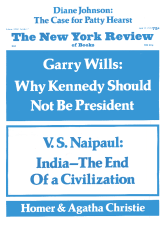In response to:
Looking for the Lost Generation from the February 19, 1976 issue
To the Editors:
Mr. Virgil Thomson, in his review of Published in Paris by Hugh Ford, in your issue of February 19th, improves, in his patronizing reference to me in it as among those who took on “size”—“not only as warriors but artists,” from their Paris associations, on the wilful perversion of literary, historical, and personal actualities that Mr. Ford commits in my regard in his book. Whatever anyone may estimate to be my “size” at any period of my writer’s working life, and denominate as literary entourage in which I am to be viewed as contained, any reckoning of my distinctions in terms of Paris associations is literarily, historically, biographically, illiterate—where it is not (disrespectfully to me) subservient to expediencies considered appropriate to the reference-occasion.
Mr. Ford’s inclusion of me in Published in Paris as mint material has no justification other than the Hours Press’s publication of two books of mine, and some contributions of mine to transition; and none of this had relation to any frequency of stay in, or visiting of, Paris by me, or residence of mine there. (I pause to note here, as to “size,” Mr. Thomson’s following, in his mention of myself and Robert Graves as a literary unit, in his citing of names of writers, works of whose were published by the Hours Press, Nancy Cunard’s obeisance-paying, in her book of memoirs of later years, to the proportions of celebrity-size and literary nobility-status to which by then Robert Graves had expanded himself, with large self-helpings from my work, poetic and other: the mention is “Robert Graves and Laura Riding,” in accordance with vulgarities of tribute to which the avant-garde critical aristocracy is as prone as the great critical middle-class of brokers in literary-importance stocks.)
My writer’s home till towards the end of 1929 was England. The publication of two books of mine by the Hours Press was plotted by Nancy Cunard and myself in London. Moreover, it was not because of these publications, and the several transition contributions, that Mr. Ford sought me out in relation to his book, which was represented to me as a book concerned with the private presses of the early decades of the century, of distributed geographical location: he wanted this projected book to include an authoritative account of The Seizin Press. The Seizin Press began as a London-based operation. In its third year it was moved to Mallorca, Spain. In the mid-thirties, it expanded from hand-printed publications to commercially produced books, with Constable and Company of London partnering in the publication-management of these, and in the imprint they bore (with England and Spain the geographical identity-points). My work for Mr. Ford’s treatment of The Seizin Press for that book (never identified between us as to be a book confined to the Paris locale) was lengthy, heavy, devoted. The resultant completed treatment was published in the English magazine The Private Library in Autumn, 1972. Without previous knowledge of the development of Mr. Ford’s book into one of all-French setting, and against my protest, as one who had been a very active contributor to the formation of the article on The Seizin Press, the article-material was included in this book by the device of shunting it into an appendix to obscure the absurdity of including it in a book of such a title, and yet keep proprietary grip on it as a valuable literary-historical asset.
I not only pronounce the described procedure an offence against scholarly propriety, and against myself, literarily, personally, and in my professional relation to The Seizin Press, in which I was first partner, Robert Graves the second, and against The Seizin Press itself as a functioning unit, and its partners jointly, and against the Editors of The Private Library, whose graciousness to Mr. Ford and myself was ignored in Mr. Ford’s meager copyright credit for permission to use the article, which by-passes reference to the magazine’s editor (Mr. John Cotten, a poet, bibliographical scholar, authority on private presses, an operator of one himself). I, further, deplore Mr. Thomson’s avoidance of all reference to the anomalous figuring of the story of The Seizin Press in this book, a mistaken kindness to Mr. Ford and his publishers, duplicating Miss Kay Boyle’s failure to point out the abnormality of The Seizin Press’s appearance in the book in the insulting status of an appendix supplement (without any comment on this treatment of the article provided), in her review of the book in another national literary magazine—which chose to ignore my protest against the book’s procedure in The Seizin Press’s and my regard, and against the injustice done in the reviewer’s handling of the matter.
Laura (Riding) Jackson
Wabasso, Florida
Virgil Thomson replies:
Mrs. Jackson’s letter seems to need answering by Hugh Ford, author of the book in question. I am not responsible for any of the faults alleged against that book, nor as its reviewer necessarily aware of the editorial decisions that determined finally its contents or their placement.
I regret sincerely of course that so powerful a poet as Laura Riding should find my mention of her patronizing. I had not so intended it.
Nor have I ever thought of her and Robert Graves as a “literary unit.” Their collaboration as publishers of The Seizin Press produced to my knowledge no unity of style or subject matter, though their friendship may have led to some borrowings, mutual or other.
This Issue
April 29, 1976



